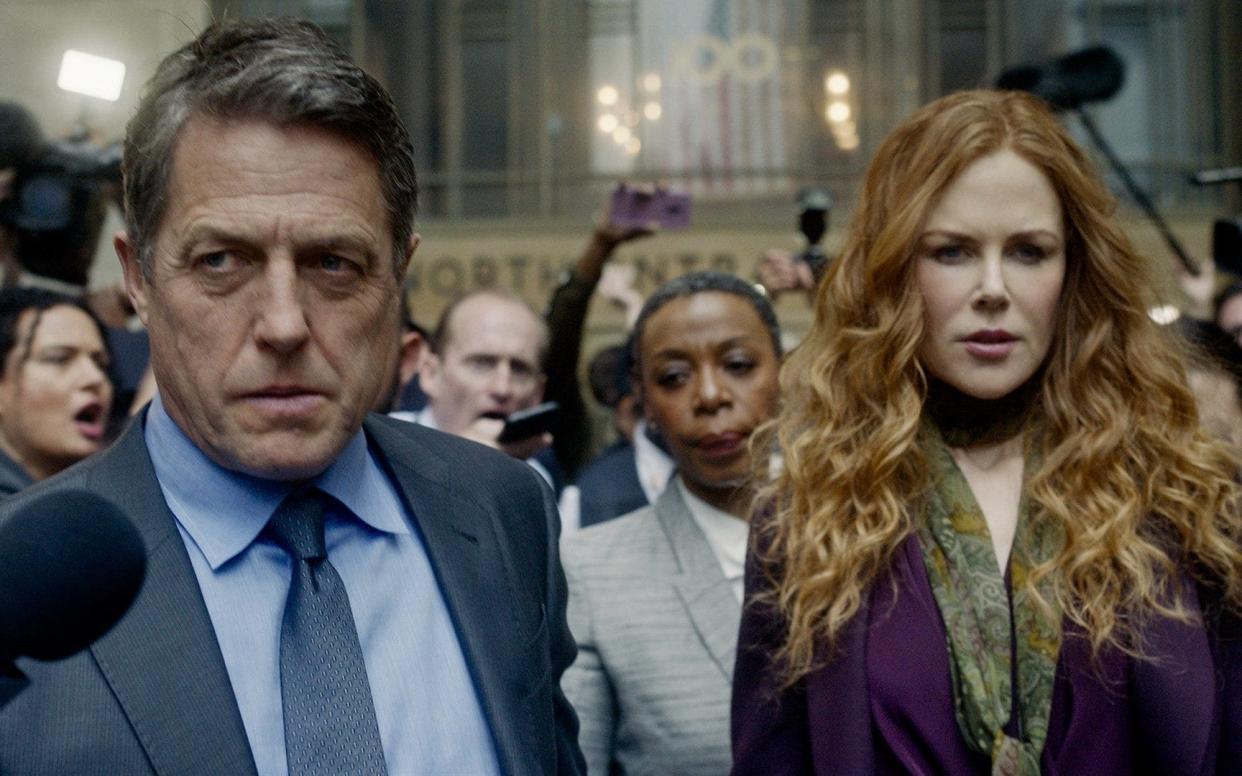Don’t feel cheated by The Undoing – it had the perfect ending

Warning: This article contains spoilers
Were you undone by the unfolding of The Undoing? For many, the glossy HBO mini series has filled the gripping drama space left by The Queen’s Gambit, and online chat has raged over who really killed beautiful, damaged artist Elena Alves.
Over the six episodes, I have been riveted by the story of these wealthy New Yorkers: Hugh Grant’s paediatric oncologist Jonathan and flame-haired therapist Grace (Nicole Kidman).
All manner of theories have developed on my sofa and in my Facebook groups. I was convinced for a while that Grace had done it. For one episode, I believed the murderer might be troubled adolescent Henry, desperate to bring an end to his dad’s damaging affair. Or perhaps it was indeed angry husband Fernando Alves, despite his rock-solid alibi.
So our bums were welded to the seats for last night’s dénouement, along with half the country (or at least, my corner of social media.) And the one character we didn’t suspect, it transpired, turned out to be the killer.
It was Jonathan all along – despite his weepy denials and upper middle-class decency, his brave grins for Henry in prison and his adoring pleading with Grace… this much-loved doctor and handsome, funny charmer was a murderer. Yes, respectable-looking men can be monsters, too.
“The plot twist is there is no plot twist,” tweeted one disgruntled viewer afterwards. Disappointment has been tangible – after all that, it was the main suspect all along?
Used to the increasingly sophisticated twists of Netflix dramas, we have become familiar with shock endings, from time travel to corrupt cops. So to be left with the realisation that all the clues had been there from the start and we just failed to put them together is somewhat dampening. But it is the most realistic ending the writers could have come up with.
It was always blindingly clear that Jonathan was a psychopath. He lied about his job, his affair and his paternity of Elena’s baby. He ran away with no thought for others, he turned up again and violently silenced Grace, and he carelessly chucked the murder weapon into the fireplace, arrogant enough to assume he’d get away with it. He returned from a scene of blood-soaked murder and made love to Grace, lied to her dad about the vast amount of money he needed, and generally behaved like a lunatic throughout.
And we still didn’t get it?
But I suspect it’s not just that we’ve been trained to expect a trick ending – it’s also that we’re deeply conditioned to trust handsome, professional men. To think that their lives could be ruined by one false accusation; one finger pointed at them. So when he stared wildly at Grace and insisted he could never take a life, I believed him.

Maybe because it was Hugh Grant – and anyone who’s starred in Paddington 2 can’t be all bad – but more likely because it just didn’t seem feasible that this successful, attractive man with his beautiful family and huge wealth would ever commit such a heinous act. Why would he?
And yet repeatedly, this has been proven wrong in real life. How many times have shocked neighbours been interviewed on TV murmuring: “He seemed such a decent family man” or “He was such a good dad”? News headlines refer to ‘loving fathers’ and ‘devoted husbands’ (a trope which thankfully is finally being challenged). Millions were convinced that Oscar Pistorius was innocent of murder, simply because he was a sporting hero.
In a landmark study of 119 cases of “middle class criminal homicide” reported by The New York Times over 20 years, 54 were described as “professionals” of whom 14 were physicians – just like Jonathan.
Because the truth is, when it comes to murder, particularly ‘crimes of passion’ as the French used to call them (as if the behaviour of the female victim was somehow to blame for a man ‘snapping’ and killing her) there is no ‘type’. It’s now well known that psychopaths often rise to the top; according to the latest medical research, it’s estimated that 1 per cent of all ‘non-institutionalised’ men over 18 fit the diagnosis. Admittedly, most don’t kill. But some do, which is why the unveiling of its anti-hero was The Undoing’s master stroke.
Of course it was Jonathan – we just didn’t want to believe it because he seemed such a nice guy. And that continues to be our big mistake.
Read more: Nicole Kidman in The Undoing reminds me of my days as a Manhattan private school mom
Read more: The Undoing finale, review: did you work out who killed Elena?


